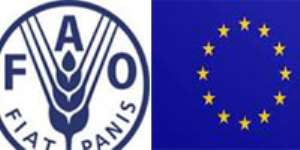
By: Masahudu Ankiilu Kunateh
The Food and Agricultural Organisation (FAO) of the United Nations and the European Union (EU) have collaborated with the government to fight illegal logging in Ghana. To this end, the EU is supporting the FAO African, Caribbean and Pacific, and Forest Law Enforcement, Governance and Trade (FAO ACP-FLEGT) support programme with 10,000 Euros to strengthen the capabilities of forest fringe communities in southern Ghana, to stop illegal logging, the FAO Representative in Ghana, Mr. Musa Saihou Mbenga has disclosed.
This project will be implemented by the Forest Research Institute of Ghana (FORIG). The EU is also supporting the World Wildlife Fund (WWF) West Africa Forest Programme Office with another 10,000 Euros to implement facilitating compliance with FLEGT and Due Diligence Regulation in Ghana, Liberia, and Sierra Leone, he added.
Speaking at the signing ceremony of the two new projects in Accra, yesterday, Mr. Mbenga explained that the ACP FLEGT Support Programme is a four year initiative funded by the European Commission of the EU and implemented through FAO.
According to him, since the inception of the programme, Ghana has benefited by receiving three projects, and now a total of five, with these two being signed yesterday.
The EU established the Forest Law Enforcement, Governance and Trade Action Plan which introduced trade relations as an opportunity to improve governance and law enforcement in the forest sector. Empowered by the Action Plan, the European Commission established the FLEGT Facility managed through the European Forestry Institute in Finland and the ACP-FLEGT Support Programme managed through FAO.
Mr. Mbenga stressed that: 'The Action Plan outlines a number of measures that support greater transparency in producer countries as well as requirements for importers in consumer countries'.
These requirements are generally agreed upon through a Voluntary Partnership Agreement (VPA) between Ghana and the EU to eliminate the flow of illegal Ghanaian timber into EU market, he indicated.
The VPA which implementation is targeted for the end of 2011 has the potential to dramatically improve governance in the forest sector of Ghana.
However, the FAO Representative was quick to observe that there are no structures and systems in place to ensure civil society and forest dependent communities.
The signing of these two additional agreements will provide support to the Government of Ghana and all other stakeholders to successfully implement the VPA and continue to improve governance of forest resources in Ghana, Mr. Mbenga emphasised.
On his part, the Head of EU Delegation to Ghana, H.E Claude Maerten observed that Ghana was the first to sign the interim Economic Partnership Agreement (EPA) with the EU, stressing that it is therefore important for Ghana to ensure that its wood products exports to EU are certified.
He, therefore, indicated that Ghana will not be allowed to export wood products into Europe, if it does not license before 2012.
A representative of the Ministry of Lands and Natural Resources announced that government was proposing wood procurement policy to ensure that all the domestic wood products were being certified.




 Dumsor: Don't rush to demand timetable; the problem may be temporary — Atik Moha...
Dumsor: Don't rush to demand timetable; the problem may be temporary — Atik Moha...
 Space X Starlink’s satellite broadband approved in Ghana — NCA
Space X Starlink’s satellite broadband approved in Ghana — NCA
 2024 election will be decided on the grounds of the economy; choice of running m...
2024 election will be decided on the grounds of the economy; choice of running m...
 Dumsor: We're demanding less; just give us a timetable — Kwesi Pratt to ECG
Dumsor: We're demanding less; just give us a timetable — Kwesi Pratt to ECG
 Do I have to apologise for doing my security work, I won’t – Simon Osei-Mensah r...
Do I have to apologise for doing my security work, I won’t – Simon Osei-Mensah r...
 All my businesses have collapsed under Akufo-Addo — NDC Central regional chair
All my businesses have collapsed under Akufo-Addo — NDC Central regional chair
 Military, Prison Officers clash in Bawku, three injured
Military, Prison Officers clash in Bawku, three injured
 GRA-SML contract: MFWA files RTI request demanding KPMG report
GRA-SML contract: MFWA files RTI request demanding KPMG report
 Court threatens to call second accused to testify if NDC's Ofosu Ampofo fails to...
Court threatens to call second accused to testify if NDC's Ofosu Ampofo fails to...
 Family accuses hospital of medical negligence, extortion in death of 17-year-old...
Family accuses hospital of medical negligence, extortion in death of 17-year-old...
